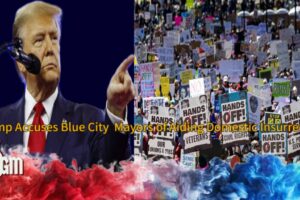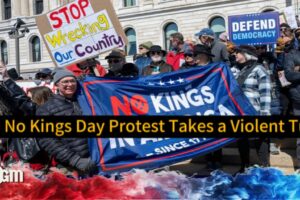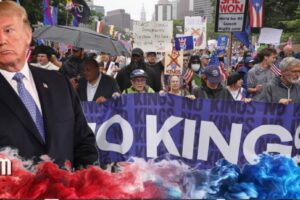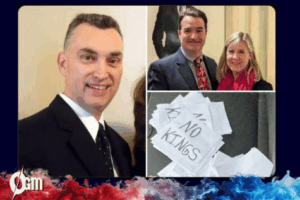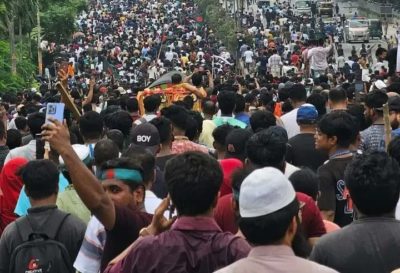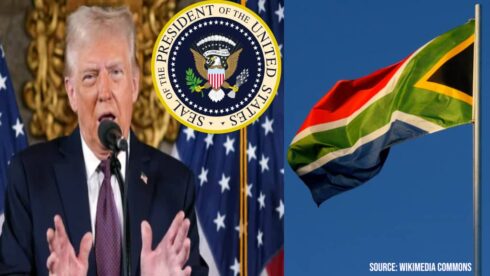A tense atmosphere gripped Bangladesh’s capital, Dhaka, on Monday as soldiers and police heavily patrolled key roads following a day of violent anti-government demonstrations. The unrest resulted in at least 98 fatalities, pushing the overall death toll from weeks of protests to 300. The protests initially erupted over the government job quota system, which reserves a significant portion of public sector jobs for specific groups.
To contain the escalating violence, the military imposed an indefinite curfew and authorities shut down mobile internet services. Roads leading to Prime Minister Sheikh Hasina’s residence were blocked, and access to social media platforms like Facebook and messaging apps such as WhatsApp was cut off. This move aimed to prevent further mobilization of protestors and curb the spread of unrest. The Bangladesh government declared a public holiday from Monday to Wednesday and indefinitely closed courts, further illustrating the severity of the situation.
Background of the Protests
The controversy over job quotas dates back to 2018 when Prime Minister Sheikh Hasina’s government scrapped a system that reserved 30% of government jobs for relatives of independence war veterans. The system, originally introduced in 1972 by Sheikh Mujibur Rahman, Hasina’s father, had been a longstanding point of contention. Protests reignited in June after the Bangladesh High Court reinstated the quota system, a decision later overturned by the Supreme Court last month, which ruled that 93% of jobs should be allocated on merit.
The Supreme Court’s decision to allocate a majority of jobs based on merit was intended to address widespread dissatisfaction among job seekers. However, the ruling failed to quell unrest, instead intensifying protests as demonstrators demanded broader systemic changes. The protests have since been marked by violent clashes with security forces, resulting in significant casualties and widespread disruption.
Protests and Government Crackdown
The demonstrations, which originated as a peaceful student movement opposing a preferential quota system for government jobs, have evolved into unprecedented fury aimed at Hasina’s increasing autocracy and her handling of the economy. Despite a crackdown that involved the arrest of more than 10,000 individuals and police cases against tens of thousands more, the protests have regained full momentum since Friday. The protesters’ outrage over the significant number of fatalities has strengthened their demands, with tens of thousands rallying on Saturday to call for Hasina’s resignation after her 15-year tenure in power.
On Sunday, the nation’s capital witnessed deadly clashes that claimed the lives of at least 94 individuals, according to Prothom Alo, the country’s foremost Bengali-language daily newspaper. Among the casualties were at least 14 members of the police force. The violent incidents also left hundreds of people wounded.
Curfews, Internet Blackout, and International Reactions
In response to the escalating violence, the military imposed a curfew on Sunday evening that encompassed Dhaka along with other key divisional and district centres. Prior to this, the Bangladesh government had already imposed a curfew with certain exemptions in the capital city and other locations. Additionally, the Bangladesh government declared a three-day holiday, spanning from Monday to Wednesday, and enforced an indefinite closure of courts.
Telecommunications have also been impacted, with mobile internet services suspended and popular social media and messaging platforms, including WhatsApp, Facebook, Messenger, and Instagram, becoming inaccessible to users. Prime Minister Hasina stated that those involved in “sabotage” and destruction during the protests were not students but criminals, urging the public to take a firm stance against them.
Security forces, including military personnel and law enforcement officers, have set up barriers using barbed wire along the streets leading to Prime Minister Sheikh Hasina’s office in the capital city. Meanwhile, the Indian government has issued a travel advisory, urging its citizens to refrain from visiting Bangladesh for the time being due to the current unrest and instability in the country.
Bangladesh Government Response and Political Implications
Prime Minister Hasina and her ruling Awami League party have condemned the protests, labeling them as acts of “sabotage” and asserting that the demonstrators are no longer students but criminals. Hasina urged citizens to handle the protestors with an “iron hand,” emphasizing that the demands for her resignation were driven by the opposition Bangladesh Nationalist Party and the banned Jamaat-e-Islami party.
The government’s response has been characterized by mass arrests, with at least 11,000 individuals detained in recent weeks. Schools and universities have been closed nationwide, and at one point, authorities issued a shoot-on-sight order against protestors. The political implications of the unrest are significant, as it underscores deep-seated grievances within Bangladeshi society and the challenges facing Hasina’s government in maintaining stability.
The unfolding crisis has drawn international attention, raising concerns about human rights and the government’s handling of dissent. As the situation develops, the impact on Bangladesh’s political landscape and its implications for future governance remain critical points of observation




